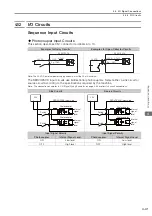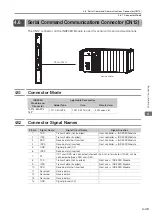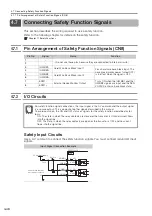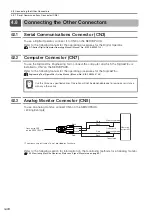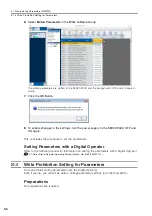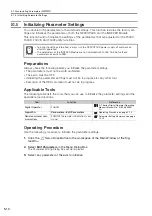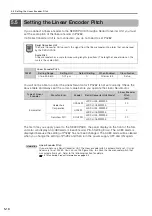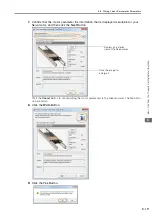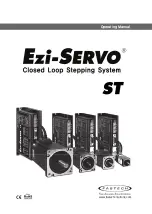
5.1 Manipulating Parameters (Pn
)
5.1.2 Notation for Parameters
5-4
Tuning Parameters
Normally the user does not need to set the tuning parameters individually.
Use the various S tuning functions to set the related tuning parameters to increase the
response even further for the conditions of your machine. Refer to the following sections for details.
8.6 Autotuning without Host Reference
8.7 Autotuning with a Host Reference
You can also set the tuning parameters individually to make adjustments. Refer to the following section
for details.
5.1.2
Notation for Parameters
There are two types of notation used for parameters that depend on whether the parameter
requires a numeric setting (parameter for numeric setting) or requires the selection of a function
(parameter for selecting a function).
•
Parameters for Numeric Settings
Pn100
Speed Loop Gain
Setting Range
10 to 20,000
0.1 Hz
400
Immediately
Setting Unit
Default Setting
When Enabled
Classification
Tuning
(default setting)
Use the encoder according to encoder specifications.
Use the encoder as an incremental encoder.
Use the encoder as a single-turn absolute encoder.
This is the setting range
for the parameter.
Parameter
number
This column explains the
selections for the function.
The notation “n.
” indicates a parameter for
selecting functions.
Each
indicates the setting for one digit.
The notation shown here means that the third digit
from the right is set to 2.
This is the
parameter setting
before shipment.
This is when any
change made to the
parameter will
become effective.
This is the parameter
classification.
This is the minimum
unit (setting increment)
that you can set for
the parameter.
Parameter
Meaning
When Enabled
Classification
Pn002
n.
0
After restart
Setup
n.
1
n.
2
Parameter
number
•
Parameters for Selecting Functions




